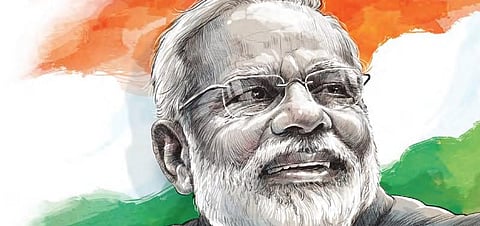

One of the striking features of the Indian political landscape over the past two decades has been the expansion of the BJP's footprint in many major states.
In Indian elections, as a general rule, the state is the fundamental political unit, and the Lok Sabha election outcome has usually been the aggregate of various state-level verdicts. The electoral verdicts in states -- at the local, state or national level –- to a great extent reflect state-level political realities. If a state government is popular, the party in power generally wins all elections in that state -- local, state and national.
Given our first-past-the-post system, once the voters perceive that a party's vote share has fallen below a threshold of about 30%, they condemn it to a state of terminal decline. Even people otherwise sympathetic to a party and its agenda tend to desert it at the time of the election as the candidates of such parties have very little chance of being elected.
Until about 2005, it was axiomatic then that a third party in a state would not be able to rise to dominance. LK Advani used to lament that the BJP was unable to expand its political base at the speed with which Congress was vacating the space.
However, over the last decade, the BJP has gained ascendancy in many states where there were only two dominant forces earlier, and where it had been a marginal player. This is a remarkable political development in our first-past-the-post system that usually only rewarded the two largest parties in a state.
When it comes to Telangana, the story of BJP's rise in the state since 2014 is in keeping with a process repeated in many states, albeit with local variations. From being the Telugu Desam Party's junior alliance partner in 2014, the Telangana BJP has made rapid strides and is now locked in a fierce combat with the Congress party to be the main challenger to the ruling Telangana Rashtra Samiti.
The Congress has the advantage of having historical roots in all districts, and the goodwill garnered from the party's role in the formation of Telangana, a decision that was made when they were in power at the Centre and P Chidambaram was the home minister.
The BJP, in comparison, has no strong roots in Telangana. But its constant advocacy for a separate Telangana state, the voters' confidence that BJP legislators will not migrate to other parties, and a united, cohesive political action and campaign give the party an edge and can help it become a major political force in the state.
There are three major factors that favour the BJP in many states, including Telangana.
First, the BJP gives the appearance of being the only major party that promotes citizens from a variety of backgrounds as leaders. The Congress and most regional parties have become private estates and family fiefdoms. The increasingly assertive voters are repelled by such political oligarchies and family rule. Truth be told, the BJP itself falls short as a political party on this count if we were to measure it by the standards of mature democracies. But the party's ability to attract talent and allow the rise of leaders based on their hard work and commitment stands out here in India.
The absolutism practiced over the years by the Congress leadership undermining all canons of democracy had sadly become the norm for most other parties. In a growing economy with increasing urbanisation, voters are yearning for parties that offer a platform for them to participate. The BJP is seen by such voters as a more credible party.
Secondly, the BJP is consciously and deliberately expanding its social base. Long perceived as an upper-caste party, the BJP is now attracting members and leaders from the intermediate castes, dalits, backward classes and adivasis. Members from these sections are rising as authentic leaders in BJP.
Third, the BJP-ruled states are practising fiscal discipline, and Narendra Modi is consistently articulating the need for infrastructure and economic growth. In the absence of a coherent economic vision from the Congress and some of the regional parties, many middle-class and urban voters are attracted to the BJP.
Healthy political competition and a viable opposition, though, are critical for the future of our democracy. The fossilized, oligarchic and dynastic political parties need to reform their party structure and allow genuine democracy in party membership, leadership and candidate selection. Parties must join hands and build consensus to eliminate vote buying and excessive short-term freebies. It is necessary for their own continued viability, and the health of our democracy. Until our polity and elections are transformed, the BJP will enjoy a huge advantage over the moribund, oligarchic parties. In the kingdom of the blind, the one-eyed man becomes the king!
(Dr Jayaprakash Narayan is a former IAS officer and the founder of the Lok Satta Party. This is part of a series of web-only analysis columns on newindianexpress.com)